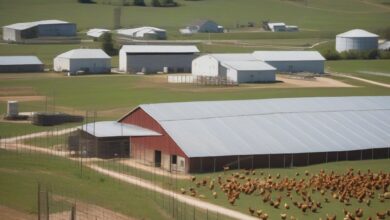Michigan’s Measures to Combat Avian Influenza Spread
Michigan’s Measures to Combat Avian Influenza Spread
Avian influenza, commonly referred to as bird flu, has raised significant concerns across the United States, with various states implementing measures to limit its spread. In Michigan, local authorities and agricultural departments are on high alert to assess and mitigate risks posed by this viral infection. This blog post will delve into the strategies Michigan employs to combat avian influenza, the implications for poultry farmers, and what residents can do to stay informed and safe.
Understanding Avian Influenza
Avian influenza encompasses a variety of influenza viruses primarily affecting birds, particularly poultry such as chickens, turkeys, and ducks. While it can occur in wild avians, certain strains pose greater health risks, including transmission to domestic birds and, in rare cases, to humans.
Key Points About Avian Influenza:
- It can lead to severe respiratory issues in birds.
- There are different strains, with H5N1 and H7N9 being especially concerning.
- Outbreaks can result in significant economic losses in the poultry industry.
- Human infections are rare but can occur through contact with infected birds.
Current Situation in Michigan
As of recent reports, Michigan has confirmed cases of avian influenza in domestic poultry. In response to these outbreaks, the Michigan Department of Agriculture and Rural Development (MDARD) has implemented a series of measures aimed at controlling the virus’s spread.
Preventive Measures and Guidelines
The state has established strict guidelines aimed at protecting domestic flocks and minimizing the risk of transmission. These guidelines include:
- Enhanced Surveillance: Regular monitoring and testing of flaunting birds, particularly in areas where wild birds gather.
- Quarantine Measures: Implementation of quarantine protocols in areas where cases are confirmed.
- Education and Outreach: Providing resources and knowledge to poultry farmers on best practices to prevent transmission.
Biosecurity Practices for Poultry Farmers
Poultry farmers are urged to adopt stringent biosecurity measures to protect their flocks from avian influenza. Biosecurity refers to practices designed to prevent the introduction and spread of infectious diseases.
Recommended Biosecurity Practices:
- Limit access to poultry houses to essential personnel only.
- Ensure that visitors have disinfected footwear and clothing.
- Implement a strict rodent and wild bird control program.
- Regularly clean and disinfect equipment, vehicles, and housing areas.
- Monitor flock health closely and report any unusual behaviors or deaths.
Government Support and Resources
The Michigan government has committed resources to support affected farmers and mitigate the impact of avian influenza:
- Financial Assistance: Farmers impacted by quarantine and depopulation may qualify for financial support through various programs.
- Testing Services: MDARD offers testing services for suspected cases of avian influenza.
- Public Health Information: The state provides regular updates and guidelines to keep the public informed about avian influenza risks.
Community Engagement and Public Awareness
Communicating the importance of biosecurity measures extends beyond the farming community. Public awareness campaigns play a crucial role in educating residents about avian influenza.
How the Community Can Help
Residents can contribute to efforts to combat avian influenza in the following ways:
- Reporting Wild Bird Deaths: Notify local authorities or wildlife agencies of any unusual findings of dead wild birds.
- Practicing Caution: Avoid contact with sick or dead birds and refrain from handling wild avians.
- Staying Informed: Follow local guidance and updates from reliable sources, including MDARD and the Centers for Disease Control and Prevention (CDC).
Future Outlook
As Michigan continues to monitor the situation, the threat of avian influenza remains a pressing concern. Ongoing research and cooperation between state and federal agencies are vital for understanding the virus’s behavior and mitigating its impact.
The Role of Research and Technology
Advancements in research are pivotal in combating avian influenza. The use of technology, such as predictive modeling and genetic studies, enhances understanding and prepares the agricultural sector for potential outbreaks.
- Surveillance Technology: Enhanced monitoring tools can provide earlier warnings of outbreaks.
- Vaccination Studies: Research into effective vaccines can significantly reduce transmission risks.
Conclusion
Michigan’s proactive measures against avian influenza are crucial to protecting both the poultry industry and public health. By implementing strict biosecurity practices and fostering community awareness, Michigan aims to contain the spread of this contagious disease. As stakeholders work collaboratively, the continuous exchange of information and resources will play an essential role in safeguarding the state’s poultry resources while also upholding public safety.
Stay tuned for updates and remember: Together, we can overcome the challenges posed by avian influenza in Michigan.
“`



